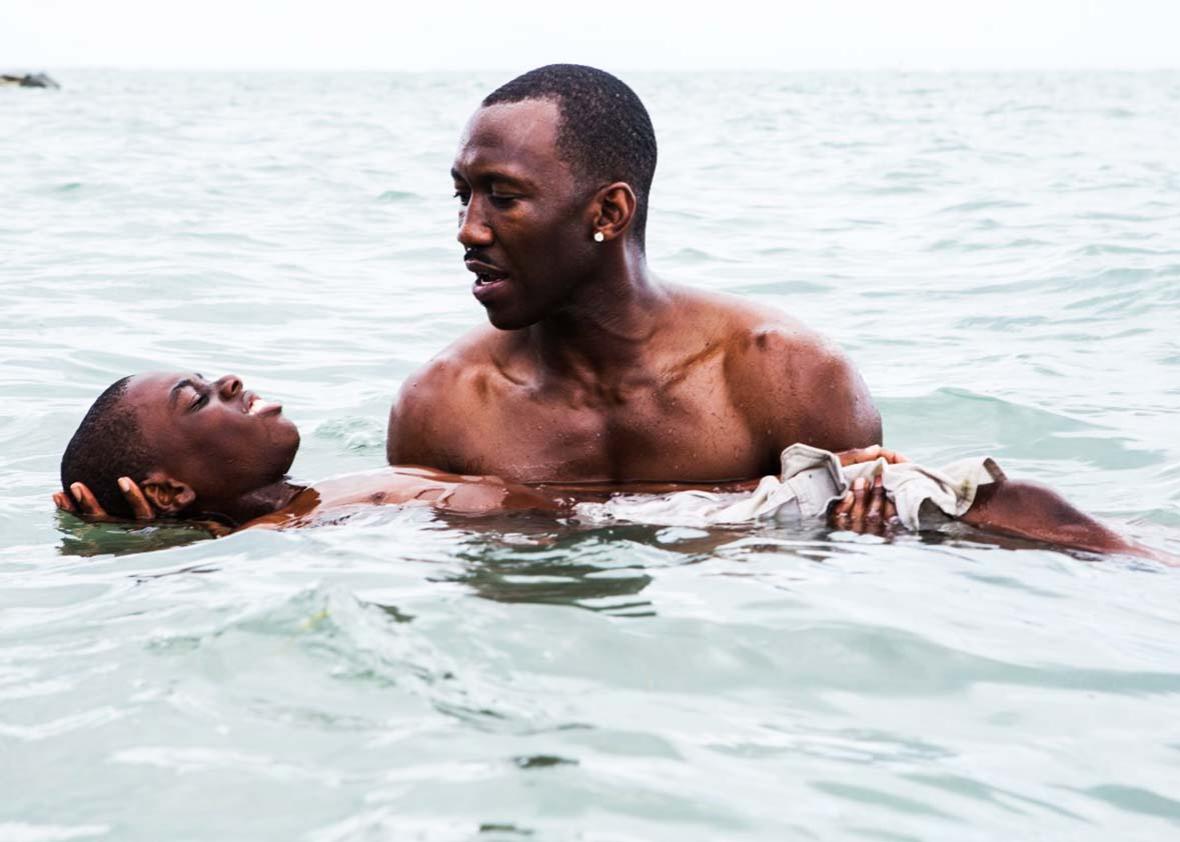When a young black man appears on screen in an American movie, there is a limited range of things his character can generally be expected to do. He can deal drugs or get addicted to drugs. He can get in fights, run from cops, get arrested, go to jail. If he’s lucky, he might get to be a cop (though often his luck runs out, and his white partner is spurred to acts of heroism by his buddy’s untimely death) or get out of jail (only to face the temptation of life back on the streets). Maybe he gets to fall in love with a good woman, but more often, he keeps that good woman down.
The main character in Barry Jenkins’ tender, lyrical, and stunning Moonlight—who’s known by a different name and played by a different actor in each of the film’s three distinct chapters—does engage in a few of the activities described above. But he also does things we almost never get to see a black male do on screen. He wrestles with the societal expectation that he project strength, invulnerability, and hypermasculine cool, even when he feels anything but strong or cool on the inside. In the transcendent nighttime scene that gives the film its title, he kisses another young black man on a beach. Most surprisingly of all, he cries. Not just once, in a single pent-up release of long-suppressed manly emotions, but several times, alone and in the company of others: sometimes from loneliness and rage, sometimes from relief and gratitude. Moonlight is one of those movies that showers its audience with blessings: raw yet accomplished performances from a uniformly fine cast, casually lyrical camerawork, and a frankly romantic soundtrack that runs the gamut from ’70s Jamaican pop to a Mexican folk song crooned by the Brazilian Caetano Veloso. But the film’s greatest gift may be that flood of cleansing tears—which, by the time this spare but affecting film was over, I was also shedding in copious volume.
Jenkins adapted Moonlight from a short play by the MacArthur award–winning playwright Tarell Alvin McCraney, who grew up in the same Miami housing project as the director, although a difference in age meant the two never met until they worked together as adults. Both men also grew up with mothers who were addicts, an experience that painfully informs the life of the main character, who maintains a remarkable consistency across the film’s three chapters even though the three actors who play him don’t particularly look alike.
As a young boy played by Alex Hibbert, he’s known as “Little,” a shy, scrawny kid who lives in a Miami project apartment with a single mother (Naomie Harris) who struggles with crack addiction. Taking refuge from a pack of bullies in an abandoned and paraphernalia-strewn house, Little is discovered by Juan (Mahershala Ali), a Cuban American drug dealer who’s tough on underperforming crew members but gentle with this wary and terrified child. Juan is unable to get a word out of Little, much less his name and address, so he lets the boy spend the night at his house, where Juan’s sweet-natured girlfriend Teresa (Janelle Monáe, effortlessly making the transition from musician to actress) gives Little a hearty meal and a glimpse of what relative domestic peace might look like. Though the boy returns to his chaotic home the next day, Juan and Teresa become Little’s unofficial godparents, teaching him to swim in the ocean and letting him spend the night when his loving but erratic mother goes on the occasional bender.
As a teenager, played by Ashton Sanders, Little has begun to go by his given name, Chiron, even if he is still on the shrimpy side and, with Juan and Teresa less able to protect him, still the frequent target of mockery by bigger, tougher classmates.* (Monáe could have used one more scene, a rare misstep in a movie full of sure steps.) Only one childhood friend, Kevin (Jharrel Jerome), takes the trouble to wonder what’s going on behind Chiron’s impassive face. One night on a deserted beach the two of them share a joint, then a kiss, then a sexual encounter that’s as delicately filmed by Jenkins as it is earth-shattering for the love-starved Chiron. But the next day at school, Kevin doesn’t just ignore his friend; provoked by a gang of homophobic bullies, he does worse.
In the movie’s third chapter, Chiron—now going by a new nickname, Black, and played with wondrous subtlety by Trevante Rhodes—has emerged as a virtual double of his onetime protector Juan, with pumped-up muscles, diamond earrings, and do-rag. Black is living in Atlanta as a successful but lonely drug dealer when he gets a surprise phone call from a repentant Kevin, now played, with winning charm, by André Holland. Their conversation, and all that comes in its wake, should be left for the viewer to discover. But I’ll say that a scene involving a diner jukebox may be the most romantic movie moment since Julie Delpy’s song at the end of Before Sunset.
Moonlight’s most noteworthy achievement, in the age of both Black Lives Matter and the backlash against identity politics, is that Jenkins mounts no soapboxes and brandishes no manifestos in his attempt to illuminate the inner life of this troubled boy turned teenager turned man. Instead he shows us the love that other characters feel for Chiron, made tangible by the generous performances of co-stars Harris, Ali, Monáe, and Holland. Chiron’s search for sexual and personal identity matters because he himself does—if not to the often cruel educational, social, and legal systems that surround him, then at least to that small group of people who love him. By the time Moonlight reaches its ravishing conclusion, that group includes us, too.
Correction, Oct. 25, 2016: Due to an editing error, this review incorrectly referred to the status of the characters Juan and Teresa in Moonlight’s second act. (Return.)
